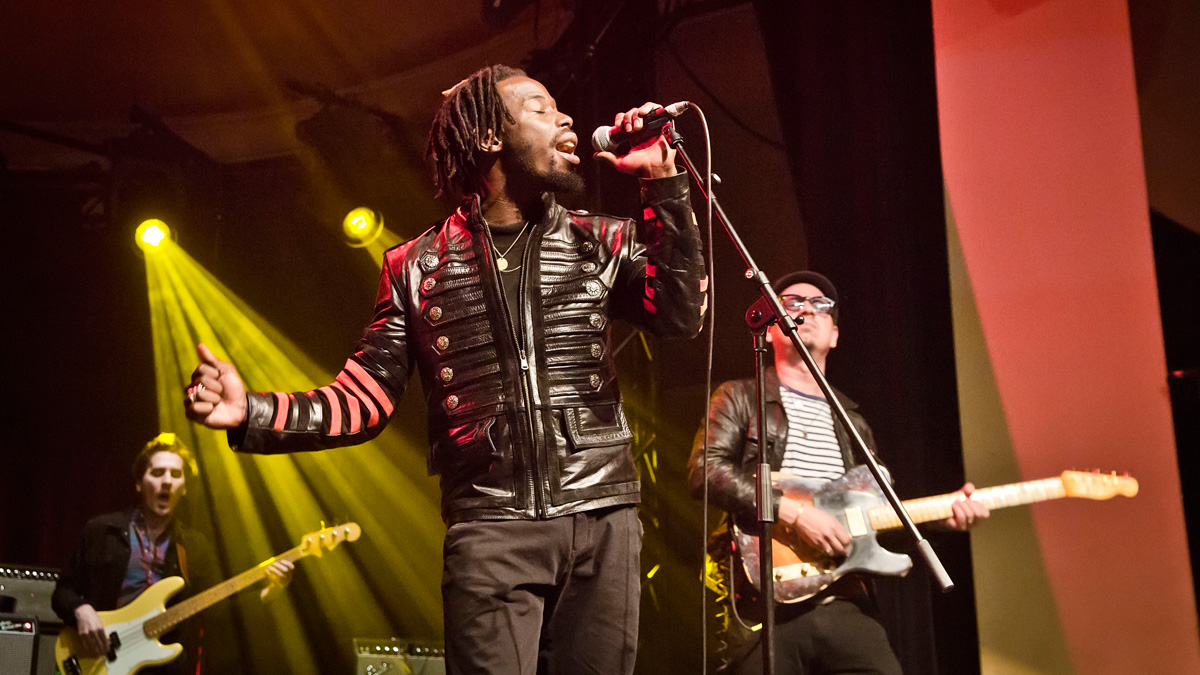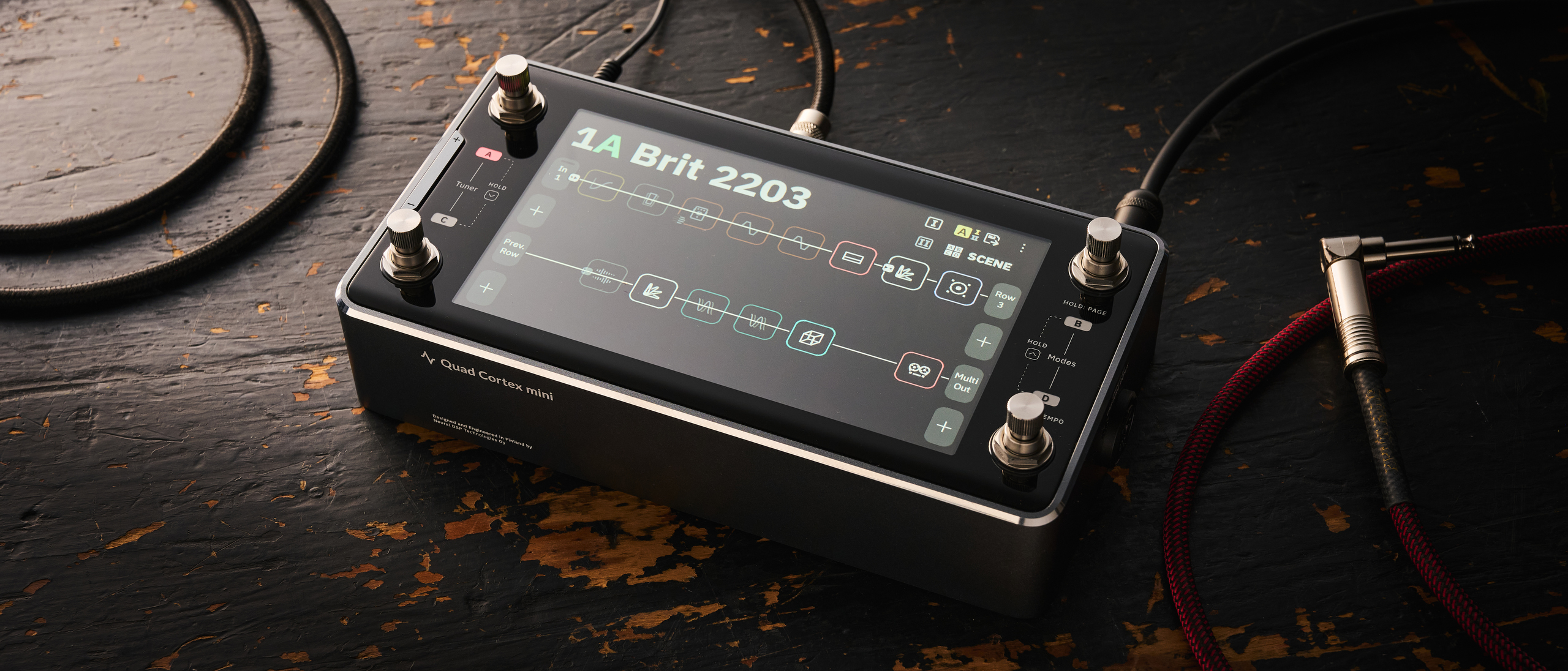
All the latest guitar news, interviews, lessons, reviews, deals and more, direct to your inbox!
You are now subscribed
Your newsletter sign-up was successful
In the musical world of unlikely pairings, it doesn’t get stranger than Adrian Quesada and Eric Burton, otherwise known as the psychedelic-soul duo the Black Pumas.
The collaboration came together at the urging of a mutual friend who told Quesada – a Grammy-winning, Austin-based guitarist and producer whose onetime band, Grupo Fantasma, toured with Prince – about Burton, a virtually unknown, self-described “acoustic busker” who was passing through town from his native Los Angeles.
“On paper, we’re not supposed to work,” Quesada says. “You’d look at our histories and go, ‘What do these guys have in common?’ But the minute I heard Eric sing and play, I knew he had something I could work with.
“He’s got incredible talent, but he’s also sincere. That’s what bonds us. Eric isn’t trying to mimic anybody, and I’m not either. We just want to be ourselves, and I think that’s why we sound a little different – and hopefully, authentic.”
The minute I heard Eric sing and play, I knew he had something I could work with. He’s got incredible talent, but he’s also sincere
Adrian Quesada
Before he hooked up with Burton, Quesada, looking to fuse his interests in Afropop and world music with retro-funk and fuzz-driven rock, had recorded almost an album’s worth of instrumental material in his Austin studio. Burton, 13 years Quesada’s junior, arrived with a background in gospel and theater, but he had virtually no experience when it came to recording.
He did, however, come ready with an intriguing passel of gutsy street-tested songs, so Quesada brought his new partner into the recording process slowly – over a year, in fact, during which time the two broke up studio time with a weekly residency at Austin’s C-Boy’s Heart & Soul bar.
“Doing the studio thing turned out to be fun and eye-opening,” Burton says. “Adrian and I didn’t always have to explain what each one was doing – it happened very naturally. But the studio is one thing and the stage is something else.
All the latest guitar news, interviews, lessons, reviews, deals and more, direct to your inbox!
“You don’t always know what you’ve got until you play your music for people. It toughens you up, and that’s a good thing. Getting those battle scars forces you to get good really quickly.”
Quesada and Burton match their disparate talents seamlessly on their debut album, Black Pumas (ATO), full of gritty, fanciful and trippy singles such as Colors and Black Moon Rising.
Released last year, the album earned them rapturous critical raves, plus a Grammy nomination for Best New Artist. Despite losing the golden phonograph to Billie Eilish, the Pumas maintain – true to showbiz tradition – that it was an honor to be noticed.
I can’t stress enough how those live shows built us up. The stuff that was already recorded just took off on stage
Eric Burton
“Everything that’s happened to us has been a total surprise,” Quesada says. “We got a Grammy nomination in our first year together – that’s not supposed to happen. Some of the other people in our category were grinding it out for a long time.
“Lizzo, I think, has been doing it for five or six years. So I can’t complain that we didn’t win. Whether there’s awards and things like that in the future for us, we’ll see. We’re in this for the long haul.”
Critics have labeled you a “soul revival” band. That element is at the core of your music, but there’s still a good amount of rock guitar playing.
Eric Burton: “Oh, definitely. We both play guitar, but I think a big part of the sound stems from Adrian.”
Adrian Quesada: “I play more of what you’d call the lead guitar parts, and I love to rock out. There’s a lot of groups that fall into that “soul revival” thing, but they don’t really embrace rock. Eric and I are equally into it. We love guitars and pedals and things.”
Who are some of your rock influences?
Burton: “As a unit, we both respect Chuck Berry. Personally, I love Jimi Hendrix and all he brought to the guitar, but I also dig rock songwriter guitarists – Neil Young and the Beatles. Those are huge influences on me.”
Quesada: “It’s funny – I never would have guessed that Eric was into Neil Young till he told me. I can watch Hendrix and freak out, but the Beatles are huge to me. Somebody like George Harrison blows me away. His guitar playing was so melodic; everything he did served the song.”
Burton: “People might not think guys like Adrian and me would be so into the Beatles, but their music speaks to us. They started out playing American rock ‘n’ roll and soul. They started to get more complex as they went on, but they had those roots. I can’t think of a rock band that isn’t influenced by them.”
How did you guys work out your guitar relationship? Do you actually discuss who does what?
Quesada: “Even though I play leads, I’ve always considered myself a rhythm player. Typically, when Eric plays guitar, it’s for a song he wrote. His playing is so unique that when we were recording, I’d just tell him to do a part himself – there was no way I could recreate it. I try to lay back a little and not let my guitar playing get in the way of his thing. I just try to complement it.”
Burton: “It’s very unspoken. Being that I came up busking, I’ve got a different style and dynamic than Adrian, but when you marry the two styles, it works. We just let our ears dictate who does what.”
I think our playing styles just allow us to get the right tones no matter what we’re playing. Everything fits like a glove
Adrian Quesada
So you have a love for the classics, but are you big vintage-gear guys?
Quesada: “I love older instruments, but we have to be practical when it comes to the road. I can’t take my vintage gear out with me – it’ll get destroyed. Luckily, we’ve got good relationships with people at Fender, who made vintage-inspired instruments for us, so we can get our sound with new gear.”
Do you pair your guitars to get a certain tonal balance?
Burton: “Sometimes we will inadvertently. Coming from playing solo gigs and busking on the street, I was mainly on acoustic. I mean, I had a Strat and a Gibson 335, but I didn’t play them that much. When Adrian and I got together, Fender reached out to us, and Adrian suggested I play a Jazzmaster or a Jaguar. I went with the Jaguar, and Adrian likes to use a Telecaster.”
Quesada: “It’s very natural, though. I think our playing styles just allow us to get the right tones no matter what we’re playing. Everything fits like a glove.”
It’s interesting you were able to fit pre-existing tracks together with new stuff.
Quesada: “That was incredible. We took our time with this. I had the stuff I pre-produced but when Eric came in he had a lot of great songs like Colors and some other things. So we recorded a little, did the live shows, and they gave us so much confidence for what we were becoming. Those live shows really allowed us to find ourselves and just tie the album together.“
Burton: “I can’t stress enough how those live shows built us up. The stuff that was already recorded just took off on stage, and when we went back to the studio to do new stuff, it’s like we could do no harm to the material. We gave it our all.“
Colors is a real standout. Eric, you play that beautiful acoustic intro that forms the bed of the song. Adrian, you play a lot of subtle stuff, but playing live, you let loose with a doozy of a solo.
Burton: “Most of the songs go through a transformation from the studio to the stage. What’s funny about Colors is, that’s the song I wrote 10 years ago when I was teaching myself the guitar. I remember sitting on my uncle’s rooftop with an acoustic learning how to play.“
Quesada: “I think that’s why it comes from a special place. That guitar part Eric plays is crucial to the song. There’s something about it that’s so unique, and I wasn’t going to get on top of it. Until the chorus, I just play a downbeat thing – you don’t need any more than that. Live, yeah, we stretch it out and I do a solo. The song really lends itself to tearing it up.“
In the song Fire, Adrian, you play a twangy solo that sounds like it could come from an Ennio Morricone score.
Quesada: “That’s exactly what I was hearing – Morricone, all the twang from those spaghetti westerns. That’s a song I recorded before I met Eric, so I was trying to make the guitar parts sound interesting without vocals. I kind of imagined them as instrumentals, so each sound had to make a real statement.“
I’d say we already have quite a few solid ideas to run with for the next album
Eric Butler
Because of the current lockdown, you can’t tour for a while. Are you already working on the second album?
Burton: “Not actively, but it’s being planned. All of our touring is on hold – so is everybody’s. I’m pretty married to my voice memos and note pads these days. I’d say we already have quite a few solid ideas to run with for the next album.“
Quesada: “It’s way early to talk about, but I think we’re going to do something pretty different from the first album – way more than people might expect. At the same time, even if we just expanded on the first record it would be pretty good, because we were such a new collaboration. We still have a lot more to say that was unsaid the first time.“
- Black Pumas' self-titled debut LP is out now via ATO.
Joe is a freelance journalist who has, over the past few decades, interviewed hundreds of guitarists for Guitar World, Guitar Player, MusicRadar and Classic Rock. He is also a former editor of Guitar World, contributing writer for Guitar Aficionado and VP of A&R for Island Records. He’s an enthusiastic guitarist, but he’s nowhere near the likes of the people he interviews. Surprisingly, his skills are more suited to the drums. If you need a drummer for your Beatles tribute band, look him up.

